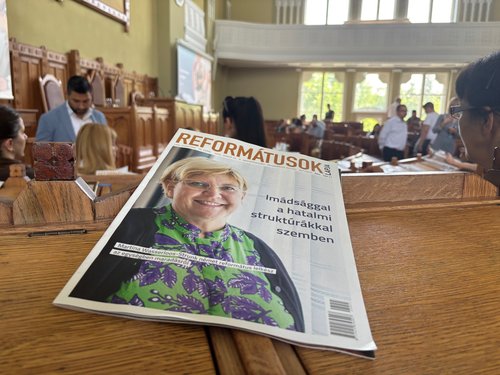The European Area Council of the World Communion of Reformed Churches (WCRC) held its annual meeting in Budapest, where a new leadership was elected. Martina Wasserloos-Strunk has stepped down as president after eight years - she started as a political scientist and now continues her ministry as a newly ordained minister of the Protestant Church in Rhineland. Building relationships with the churches of Eastern Europe, theological advocacy against global injustice and opportunities for dialogue have been at the heart of her work. What has Accra, Lebanon or Transcarpathia taught her? And what is her message for the next generation, searching for an authentic Christian voice in an increasingly complex world? The words of the outgoing President are both a reckoning and a hope for the future.
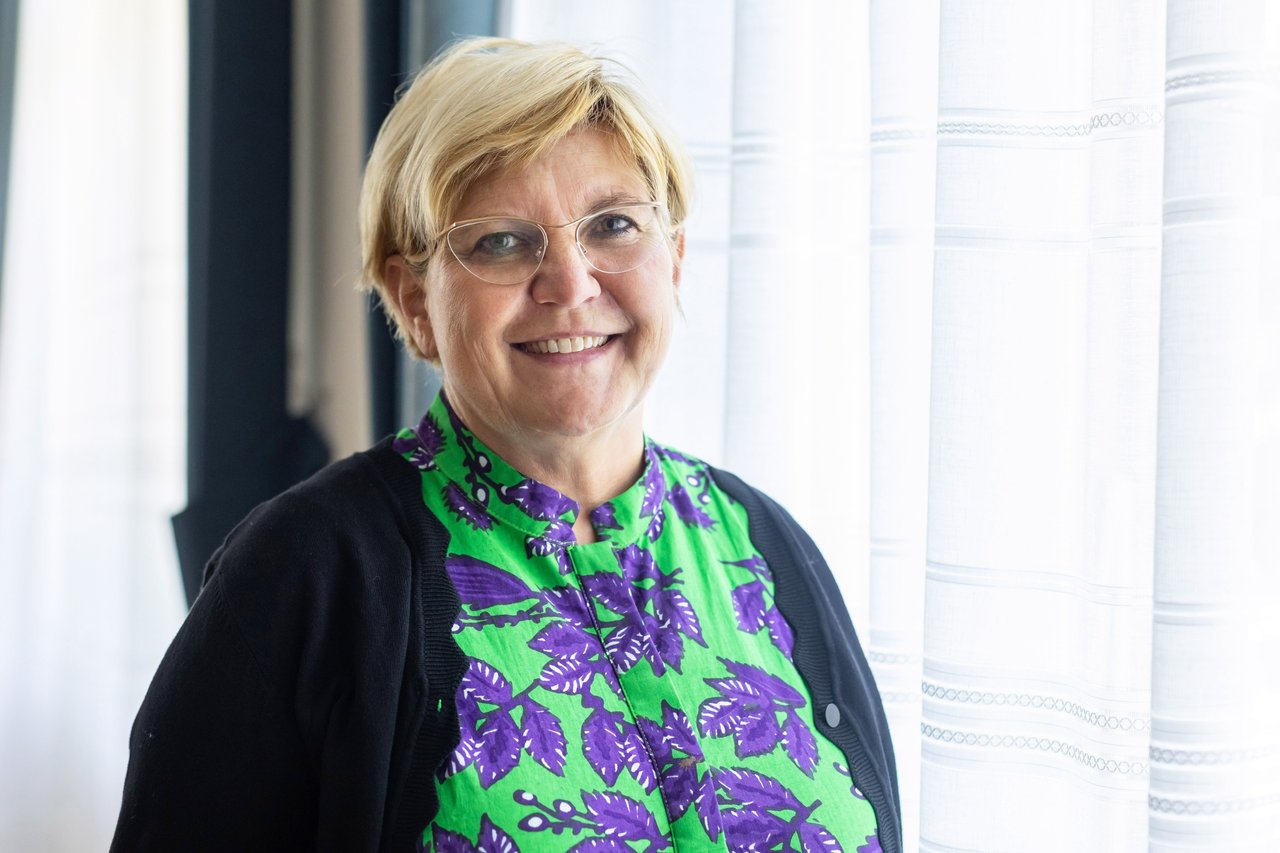
Martina recently completed her theological studies and was ordained as a pastor on June 1. Previously, for many years, she was a political scientist and played a leading role in the exchange and cooperation amongst the Reformed churches in Europe. She now brings her social and political experience to her ministry as a pastor.
How are you experiencing this change?
When I started to work in the European region of the World Communion of Reformed Churches (WCRC), I considered two areas particularly important: on the one hand, I wanted to link issues of faith with social engagement, and on the other hand, I wanted to understand church-cultural contexts that were previously far from me, since I had little contact with the churches of Central and Eastern Europe. Over the years, I also became more and more interested in theology. But this journey is still very fresh for me. I do not see the ministry as a final destination, but as a ministry in which I can use my previous experience, especially my knowledge of political science.
How did your journey lead you to ecumenical leadership?
The first important milestone for me was the 2004 General Assembly, organised by the World Alliance of Reformed Churches (WARC) in Accra, the capital of Ghana. At the heart of the meeting was the issue of global economic injustice—a passionate debate between churches in the North and those in the South, primarily in Africa, South America, and Asia. Issues of capitalism, power imbalances and social exclusion were on the agenda. I was also involved in the drafting of the Accra Confession of Faith, which sought a theological response to these issues. I was very young, but I was impressed by the diversity of voices, stories and gifts in this global community. It was then that I first understood the responsibility of bringing so many different experiences into harmony. Although I never aspired to a leadership role, I was asked to take one—and so began an eight-year period that is now coming to a close.
I consider one of the gifts of my ministry to be the relationships I have developed over the years with Reformed churches in Romania, Hungary and Transcarpathia. As a political scientist, I have always been concerned about how to rebuild faith in a society where communism has long stifled religious thought. What is on people's minds on the other side of the former Iron Curtain? What do they need? These were the questions I was looking for answers to, and I was convinced that we could build bridges between us. That is why I always tried to argue in the meetings: even if we think differently about family, sexuality or other sensitive issues. For me, it is important that these differences do not become walls, but rather spaces where dialogue can take place. I found that as a woman, I often received a different kind of attention - I was listened to more openly, more politely. And perhaps it also mattered that I was not presenting myself as the leader of a large, influential Western church, but as someone with less formal power - yet the opportunity for personal contact came from that.
My fundamental conviction that faith cannot be separated from social responsibility, from solidarity with the suffering, the Accra Confession of Faith reflected this. It was then that I experienced for the first time the power of bringing different voices together in harmony and sharing a common witness. Even then, we recognised it, but today we can see in Ukraine, Taiwan or even Los Angeles how global power structures work, against which we are often powerless. For me, as a political scientist and theologian, this question has become a central theme since Accra: how can we as Christians respond authentically and responsibly to these challenges?
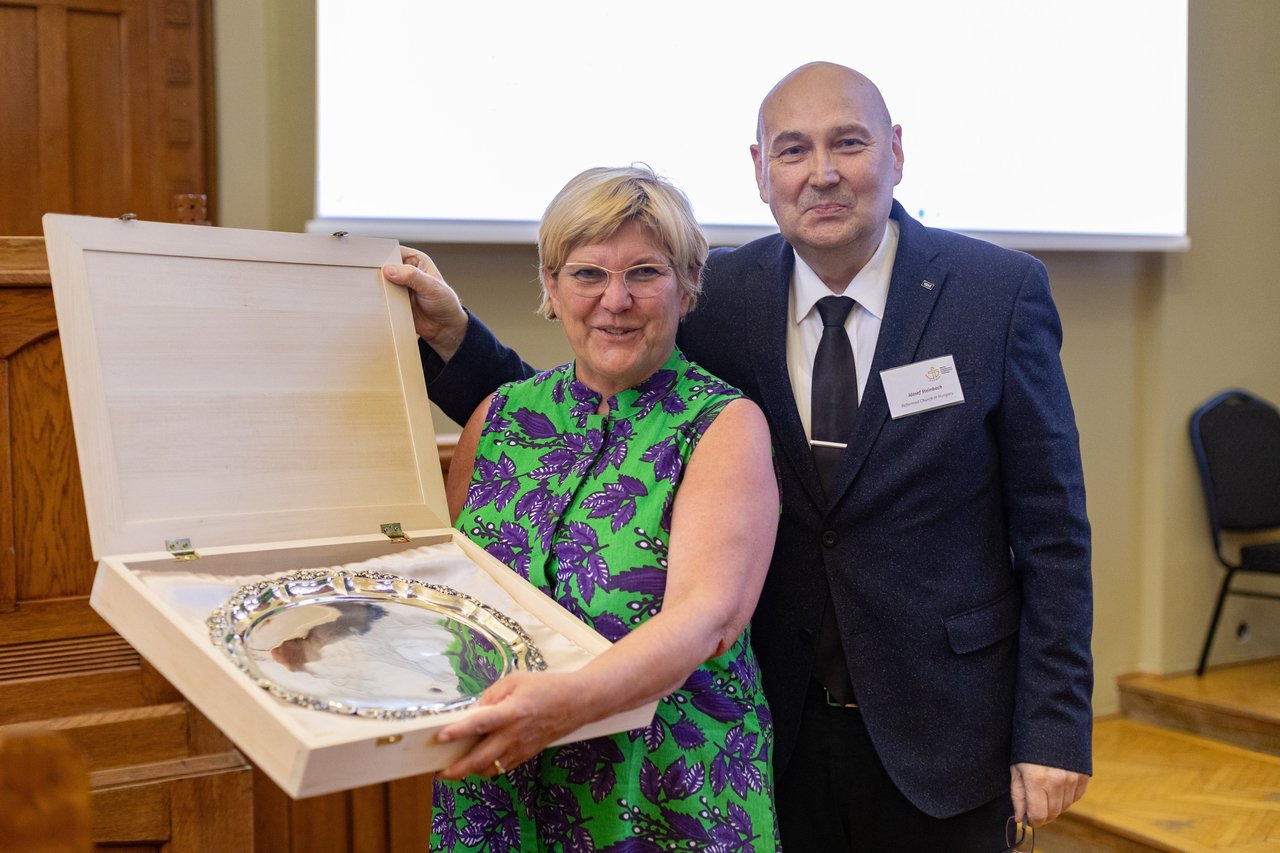
During the Area Council, Bishop József Steinbach, ministerial president of the Synod of the hosting Reformed Church in Hungary acknowledged and thanked for Martina's work
Have the churches themselves become part of these power structures?
Yes, and we see that clearly today. I participated in the conferences held to mark the 20th anniversary of the Accra Confession of Faith. The churches of the Global South were again present and brought the same picture: an experience of injustice. They were deeply shaken by the lack of access to medicines during the AIDS epidemic and the lack of access to vaccines during the coronavirus epidemic. The same pattern repeats itself: power structures and those who become their victims. And increasingly, we are becoming victims ourselves. In Ukraine, Lebanon, Syria, and Gaza.
Ukraine is also a victim of these power structures and the global interests of big business. I think that today 'empire' is a fluid concept. It is constantly changing. So the empire searches, builds, combines - and we cannot do anything about it. In recent years, I have been in very close contact with the Reformed Church in Transcarpathia. And what I hear from them: fear, vulnerability, helplessness.
When you look at all this from the safe, well-functioning, clean Germany, the contrast is particularly stark. Many people think that the only right answer is to send weapons to Ukraine. But I have never heard anyone in Transcarpathia say that. On the contrary. That is why, in every seminar I have the opportunity to attend, I tell what I have experienced - what I have seen and what I have heard there in person.
In recent months, she has been in Transcarpathia several times, visiting homes for the elderly. What have they shared with you? What burdens do they carry?
First of all, they talked about the pain they feel for their families - not being able to live with their loved ones because their children are abroad. They told me that their sons do not go to school in the next village, but in Budapest or elsewhere. It is becoming increasingly difficult to find a school nearby that works, because the shortage of children means that it is no longer worth opening a school. The situation of the elderly is extremely desperate. Even before the war, poverty and low pensions were a problem for them, and now many are completely alone, with family members living abroad or doing military service. They feel forgotten. Once, I was talking to an elderly lady, and I took her hand. She said, 'You are the first person in weeks who has touched me.' On my last visit, I was given a pair of white socks as a gift - one of the old ladies had knitted them herself. That gesture said more than anything.
What kind of solidarity do you think can really help from the churches?
I found that the most frequent request was: ’Please pray for us.’ At first, I honestly did not understand. I asked: ‘What can I do? What can I say? What do you need? Money? Should I come every week and bring volunteers?’ But that's not what they asked. That's not what they really needed. In Lebanon, I was at the Unheard Voices conference, where women from the Middle East, Transcarpathia, the Carpathian Basin and Northern Ireland gathered. They are the ones who bear the deep wounds of war, flight and loss. But how can war be eliminated? What does aggression mean? What is like peaceful coexistence?
These are themes that have haunted me from the beginning of my life. And now, 80 years after the Second World War, I see history repeating itself. The same psychological patterns, the same aggression, the same power structures are returning. I was very touched when the women in Beirut shared their stories - whether they were from Syria, Lebanon, Ireland or Ukraine, they all spoke about the same experiences of war. One of the women in Beirut said to me, ’Please pray the Psalms for me. I can no longer pray.’ That was when I really understood that prayer is not so little. Because it is not a question of what we can bring to Transcarpathia, for example, with our own strength, because we do not really have any strength.
Last time I asked the women there: ’Should I even come? Are you not overloaded with visitors?’ I did not understand why they always say: ’Come, please, come and pray with us! Be with us - we will gather the people.’ Perhaps prayer is a particularly feminine task. Not the kind that traditional, male church leaders are used to doing. But perhaps it is this kind of presence, compassion and relationship-building that is most needed now.
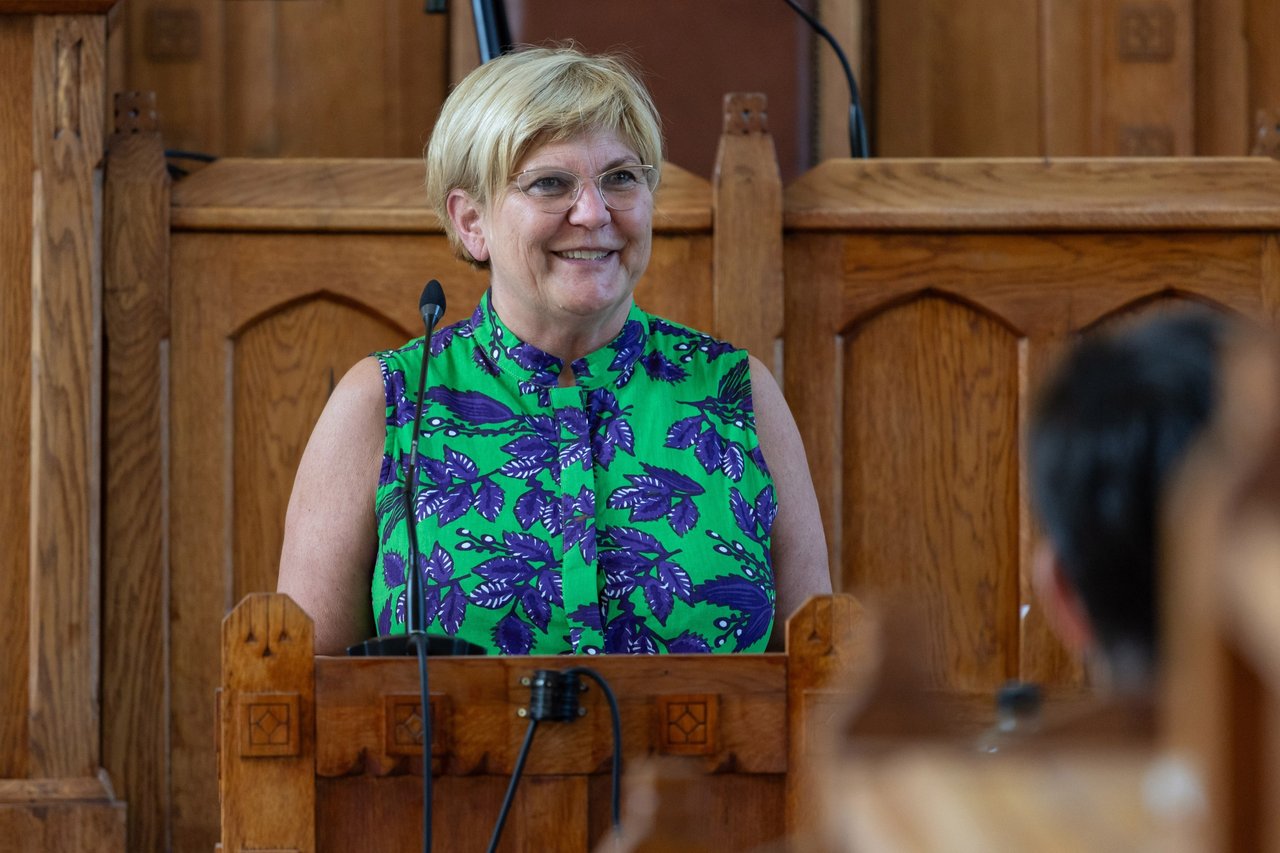
Moderating her last WCRC European Area Council meeting
What has been your experience with the National Evangelical Synod of Syria and Lebanon? How are they able to live their faith there in the context of war?
Lebanon is involved in the conflict between Israel and Gaza in a very specific way. It is a society which, strange as it may sound, is almost used to being in a crisis situation. For them, the ongoing crisis has become part of everyday life.
As Rev. Najla Kassab, pastor of the National Evangelical Synod of Syria and Lebanon - who is also president of the World Communion of Reformed Churches - once said to me: ‘Everybody talks about trauma - how Israeli society or Gaza society has been traumatised. But no one mentions us. We live in a society at war. We are also traumatised.’ I never thought about it before, but of course, you are absolutely right. Lebanese society has been living in a war reality for many years. The Church is strong there, but it is operating in extremely difficult circumstances, and it has to find its place with other religions and bear witness. Najla also shared a story with me that tells us a lot about how they live their faith in this context. When distributing food to refugees from Gaza, one of the volunteers said: ‘These are Muslim people. I don't want to give them food.’ Najla replied, "They are God's creatures, too. They are God's creatures, too, so you will give them the food.” They are God's creatures, they are God's people. There, at that moment, it was not a question of being Christian or Muslim. It was about being a refugee in need, a man made in the image of God.
This was your last official visit to Lebanon. Do you see any possibility of staying in informal contact with the community there?
Yes, I want to stay active, especially through work in the Women's Network. It's not formal yet; it has to be approved by the board, but I think they will support me.
I feel it's good that the chairmanship is now being taken over by a new person, with new ideas and a fresh vision. Nevertheless, I am a little sad. But I am also excited because I am part of a new work process: we are working with a working group on what real worship and real community means: how can we be authentic in the European context? I hope that next year the Council can come up with a meaningful, forward-looking document on this. So I'm not disappearing completely - the ministry continues, just in a different form now.
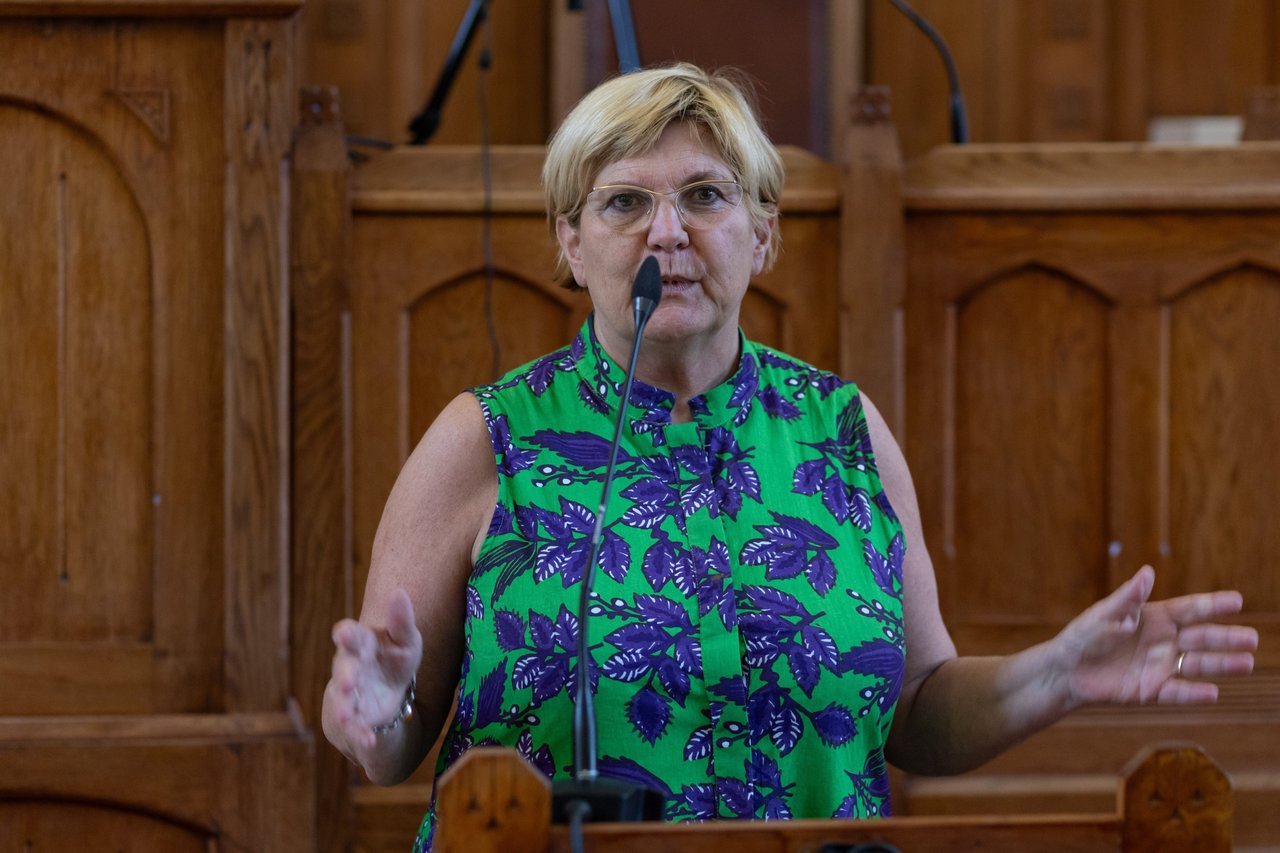
You served as President for eight years. Looking back on that time, is there anything - if I may ask - that you are particularly proud of?
I guess "pride" isn't quite the word I like to use... but still... maybe I can say that I have a sense of well-earned satisfaction. My aim has been to build relationships, and I think - and we have seen this in the council meetings, for example, in Switzerland - that churches that never came to our council meetings before are now present. The member churches in Eastern Europe are also interested; they want to participate, and I think that is the result of the attention and patience with which we have built. So... I can't say I'm proud - but in a way I am a little bit.
What advice would you give to the next generation of Reformed church leaders - especially the new president - in such a complex political and ecclesial environment?
These are challenging times, and the situation is not easy - in fact, it is getting harder. The new president has a big task ahead of them: to help member churches stay together and find unity. It will be important to look for what binds us together. Today we live in times when we need cooperation, communication and personal relationships. I think the next President will know this, even if they are new to the job. It takes great courage, but it can lead us forward: to stand together and speak the truth.
Persevering in Witness
The World Communion of Reformed Churches European Area Council met in Budapest to prepare for the General Council in October and to elect new members to the steering committee for the upcoming term. Delegates from seventeen countries across Europe gathered in Budapest from June 11 to 12.
Originally published in the 'Reformátusok Lapja', the weekly magazine of the Reformed Church in Hungary
